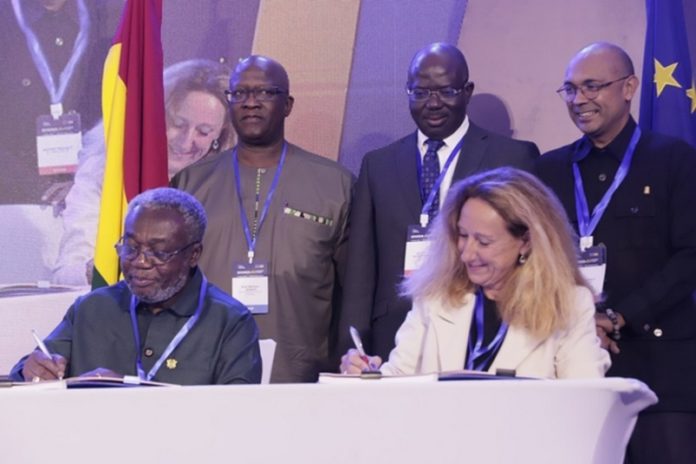The European Union (EU) has awarded a grant of €32 million to support vaccine manufacturing and the pharmaceutical industry in Ghana.
The grant was made possible through the government, under a Special Measure on Manufacturing and Access to Vaccines, Medicines and Health Technologies in Africa (MAV+) programme.
The support would help to establish a thriving ecosystem to train the needed skill-workforce, strengthen research and develop capacity. It would also establish the necessary regulatory system, continue support for the Food and Drugs Authority (FDA), facilitate technology transfer and build bilateral and multilateral partnerships for vaccine and pharmaceutical production in the country.
Signing of agreement
In line with that, the two parties — the government and the EU, have signed a financing agreement to launch the Ghana component of the Special Measure on MAV+. The MAV+ is an initiative of the EU Commission backed with a €1.3 billion in grants and loans, consisting of over 80 specific projects in Africa.
The Deputy Director-General of the European Union Commission, Myriam Ferran, signed on behalf of the commission, while the Presidential Advisor on Health, Dr Anthony Nsiah-Asare, appended his signature for the government during a two-day Ghana-EU Business Forum in Accra last Tuesday.
The forum was on the theme: “Fostering an investment in non-traditional value chains under the EU Global Gateway Strategy”.
Significance
Ms Ferran expressed satisfaction over the agreement, and said it would help strengthen the country’s healthcare sector and increase access to quality health products. She said the support for the local vaccine manufacturing sector in Ghana was a priority of their planned Joint Programming for 2021-2027.
Ms Ferran added that the project demonstrated their commitment to support and respond to high political priorities in the country. “The EU is committed to supporting Ghana’s development goals, and this investment in vaccine manufacturing and pharmaceuticals is a testament to our partnership. This programme will not only enhance Ghana’s healthcare sector, but also contribute to the growth of the country’s economy,” she said.
Since 2022, the Deputy D-G said the EU had been delivering on its promises of giving support to vaccine manufacturers, both at the private and public sectors in Ghana. Together with the German Development Cooperation, the EU launched a €3.1 million project to enhance the capacity of Ghana’s Food and Drugs Authority (FDA).
In 2023, through the European Investment Bank, the union also provided a €5 million grant to DEK Vaccines Ltd to support the construction of a fill-and-finish vaccine manufacturing facility located at Medie in the Greater Accra Region.
The EU Ambassador to Ghana, Irchad Razaaly, also said that since December 2021, the EU Global Gateway Strategy had been offering unique opportunity for his outfit and Ghana to strengthen economic ties, foster innovation and create sustainable value chains.
”Indeed, this is what we are pursuing in our economic cooperation with Ghana to support more value-added products exported from Ghana to the EU and to the world, beyond the traditional raw materials such as gold, petroleum or cocoa,” he added.
Appreciation
For his part, Dr Nsiah-Asare expressed appreciation for the opportunity to collaborate with the EU since the inception of the President’s visionary initiative to make Ghana a regional vaccine manufacturing hub.
“I extend my sincerest gratitude to the EU for their unwavering support and close collaboration which has been instrumental in driving this vision forward,” he said.


